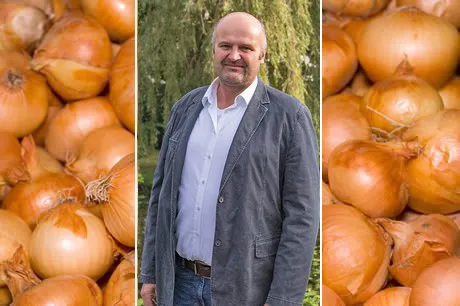The onion trade was getting ready for the final chapter of the season in December. Exporter Piet van Liere of Flevotrade Dronten is drawing up a mid-term review. “Not much is left to sell. In figures we’ll just be out of Dutch onions in spring. But that’s a good thing, because we don’t have any onions that can be stored for a long period this year.”
It wasn’t a big surprise for Piet that yields were this low. “Fortunately I still have some farmer’s blood in me, so volumes weren’t too surprising. However, it was very difficult to predict how price levels would develop in advance.”

“We naturally started at a fairly high level, but price levels then remained stable for a long time. Bale price and grower’s price were out of proportion for a while. Onion prices only had a slight peak in recent weeks,” the exporter looks back.
Limit
When asked if prices for destinations such as Africa can be too high, Piet answers: “That’s what’s happening to potatoes now, those are easily replaced by other food products. Onions are a basic ingredient for Africans, but there’s naturally a limit to that when prices are too high. After all, we’re bringing the onions to the poorest part of the world.”
“Besides, this year we don’t have onions that can be stored for long periods at our disposal. Sprouting would cause too many problems. Growers are quick to say we’ll just have to deal with what we’re given, but try explaining to a customer on the other side of the world why they pay high prices only to find 20 per cent of the onions they bought sprouting.”
“In the end, interesting volumes were sent to destinations such as Indonesia and Africa, supplemented with some other destinations. Even former Eastern bloc countries are now carefully starting to ask questions. That doesn’t mean volumes are sent there right away, but I think it’s remarkable these countries are starting to ask around so early in December,” Piet continues.
Remarkable spring
“It could still turn into a very remarkable spring, countries that would normally export could now start importing. Everyone is now strengthening their bonds overseas, but everything that will be imported can’t travel the world a second time, so those imported onions will just have to be distributed in Europe,” Piet says.
“All in all, it’s a remarkable year in which the Netherlands, as biggest onion export country in the world, can’t always meet demand. A disadvantage of this situation could be that sales countries will also start looking around more than they’ve done in the past. On the other hand, the Netherlands has a trump card because we export onions all over the world at the cheapest possible cost price. In a new season with new kilos we’ll be a regular player like always.”
Besides, Flevotrade is one of the few processors in the area reporting the highest yields. “A lot of growers in the southwest couldn’t irrigate, and these have had to accept the worst blows due to the warm weather in recent years. Our yields in the polders were much higher,” Piet confirms. “Because of this, production has partly shifted north in recent years. Just take Drenthe, for instance, about 1,000 hectares were added there in the past five years.”
Although the season is causing quite a bit of worry, the exporter is experiencing it as a wonderful time. “Large sums of money are now crossing oceans. That’s very exciting on the one hand, but at least it’s more fun than trading onions that cost only a few cents. No one would make a profit in that case, at least there are options at this level.”
More information:
Flevotrade Dronten
Piet van Liere
piet@flevotrade.nl
www.flevotrade.nl
